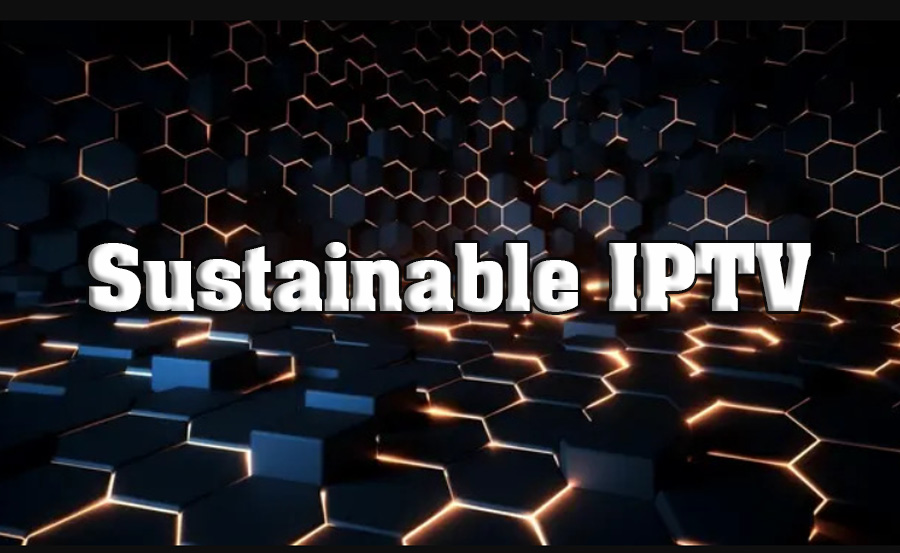As the demand for streaming content continues to grow, IPTV providers face increasing pressure not only to deliver high-quality services but also to operate sustainably. IPTV operations require substantial energy, data resources, and infrastructure, all of which impact the environment. Integrating sustainable practices into IPTV operations can reduce ecological footprints, lower operational costs, and meet the growing demand for eco-friendly services. This article explores effective strategies for enhancing sustainability in IPTV, from energy-efficient infrastructure to responsible content delivery.
Buy 1 Year IPTV and Enjoy Unlimited Content
1. Optimizing Energy Efficiency in Data Centers
Data centers are the backbone of IPTV services, supporting content storage, processing, and distribution. However, they are also significant energy consumers. Improving the energy efficiency of data centers is crucial for sustainability. IPTV providers can achieve this through optimized cooling systems, efficient server utilization, and advanced energy management practices.
For instance, employing techniques like free cooling (which uses ambient air to reduce the need for air conditioning) and using energy-efficient hardware can lower energy consumption. Additionally, moving to modular data centers that only activate resources based on demand allows IPTV providers to avoid unnecessary energy expenditure. Monitoring and managing server load can further help distribute resources evenly, reducing waste and improving overall efficiency.
2. Leveraging Renewable Energy Sources
Switching to renewable energy sources, such as solar, wind, or hydroelectric power, can significantly reduce the carbon footprint of IPTV operations. Many data centers and IT companies are making this transition as renewable energy becomes more affordable and accessible. For IPTV providers, investing in renewable energy or partnering with green energy providers ensures that content delivery is powered by sustainable sources, aligning with eco-conscious values and reducing reliance on fossil fuels.
Some IPTV companies have also committed to carbon offset programs, investing in environmental projects that balance their carbon emissions. This strategy not only contributes to environmental sustainability but also enhances brand reputation, appealing to environmentally-aware consumers.
3. Implementing Efficient Content Delivery Networks (CDNs)
Content Delivery Networks (CDNs) are critical for IPTV, allowing for faster content delivery and improved user experience. Efficient CDNs minimize the energy and bandwidth needed to stream content, reducing environmental impact. By caching content at multiple server locations closer to end-users, CDNs reduce the distance data must travel, leading to lower latency and energy usage.
Choosing eco-friendly CDN providers who prioritize energy efficiency or use renewable energy to power their servers is another way IPTV companies can support sustainable operations. Furthermore, optimizing CDNs with adaptive streaming technologies reduces bandwidth consumption by adjusting video quality based on user connectivity, minimizing resource use without sacrificing user experience.
Advanced IPTV Box Settings: A Complete Guide
4. Minimizing Bandwidth and Data Consumption
Reducing bandwidth consumption is a sustainable practice that also improves user experience by minimizing buffering. IPTV providers can achieve this by implementing advanced video compression techniques, such as H.265 (HEVC) or AV1, which allow for high-quality streaming at lower bitrates. These codecs significantly reduce data usage and, consequently, the energy required for data transmission.
Additionally, encouraging users to download content for offline viewing or offering options to stream in lower resolutions helps to conserve bandwidth, particularly during peak hours. By educating users about these options, IPTV providers can promote sustainable streaming habits, reducing unnecessary data consumption.
5. Using Adaptive Bitrate Streaming to Reduce Waste
Adaptive Bitrate Streaming (ABR) enables IPTV providers to dynamically adjust the quality of video based on the viewer’s network conditions. ABR prevents unnecessary data usage by only delivering high-quality streams when the network supports it, thereby conserving resources. This technology is especially beneficial in low-bandwidth environments, where constant high-bitrate streaming can lead to data wastage and increased carbon emissions.
By implementing ABR, IPTV providers can deliver an optimized experience that conserves bandwidth without sacrificing quality. This practice not only reduces the environmental impact but also benefits users by providing a smoother, more consistent streaming experience.
6. Eco-Friendly Packaging and Device Recycling
For IPTV providers that supply set-top boxes or other hardware, adopting eco-friendly packaging and device recycling initiatives is essential. Using recyclable or biodegradable packaging materials reduces waste and minimizes the environmental impact of product distribution. Additionally, offering take-back programs for outdated or broken equipment encourages users to recycle their devices responsibly, preventing electronic waste from entering landfills.
Some providers have started using refurbished devices or sourcing components made from recycled materials, further promoting a circular economy. These initiatives demonstrate a commitment to sustainability and provide eco-conscious users with a way to participate in responsible consumption.
7. Remote Work and Virtual Collaboration to Reduce Carbon Footprint
Encouraging remote work and virtual collaboration within IPTV operations can also contribute to sustainability goals. By reducing the need for commuting and office energy usage, IPTV providers can significantly lower their carbon footprint. Remote work allows companies to downscale office spaces, reducing heating, cooling, and lighting demands.
Virtual collaboration tools, such as video conferencing, file-sharing platforms, and project management software, enable efficient communication and project management without the need for physical meetings. This approach is not only cost-effective but also aligns with sustainable practices by minimizing travel-related emissions.
8. Monitoring and Managing Environmental Impact
Accurate monitoring and reporting are essential for any IPTV provider committed to sustainability. By tracking energy usage, carbon emissions, and waste, providers can assess the environmental impact of their operations and identify areas for improvement. Many IPTV providers are now adopting Environmental, Social, and Governance (ESG) reporting standards to ensure transparency and accountability in their sustainability efforts.
Using analytics to monitor server performance, data usage, and viewer engagement also provides insights for optimizing resource allocation. This data-driven approach enables IPTV providers to make informed decisions that align with both operational efficiency and sustainability goals.
How to Organize Your Channels Effectively in Lazy IPTV
9. Educating Users on Sustainable Streaming Practices
User behavior plays a significant role in the overall sustainability of IPTV services. Providers can promote sustainable streaming practices by educating users on energy-saving features, such as enabling lower resolutions, downloading for offline viewing, or setting device timers. These small changes can reduce unnecessary streaming and help conserve resources.
Creating awareness through in-app notifications, blog posts, or social media can empower users to make eco-friendly choices. Additionally, promoting energy-efficient devices for viewing IPTV can encourage consumers to use more sustainable technology, contributing to lower overall energy consumption.
10. Investing in R&D for Sustainable Innovations
Innovation is key to driving sustainability in IPTV. By investing in research and development, IPTV providers can explore new technologies and methodologies that further reduce environmental impact. Innovations such as AI-driven data management, energy-efficient encoding, and improved streaming protocols can enhance sustainability in the long term.
Collaborating with technology companies, universities, or environmental organizations can accelerate the development of green solutions tailored for IPTV. These partnerships not only advance sustainable practices within the industry but also contribute to broader environmental goals.
Conclusion
Sustainability in IPTV operations is both an environmental responsibility and a strategic advantage. By adopting practices such as optimizing data centers, using renewable energy, implementing efficient CDNs, and educating users on eco-friendly streaming habits, IPTV providers can reduce their ecological footprint while meeting growing consumer demand for sustainable options. As the IPTV industry evolves, incorporating sustainability into every aspect of operations will be essential in creating a responsible and forward-thinking streaming ecosystem.




